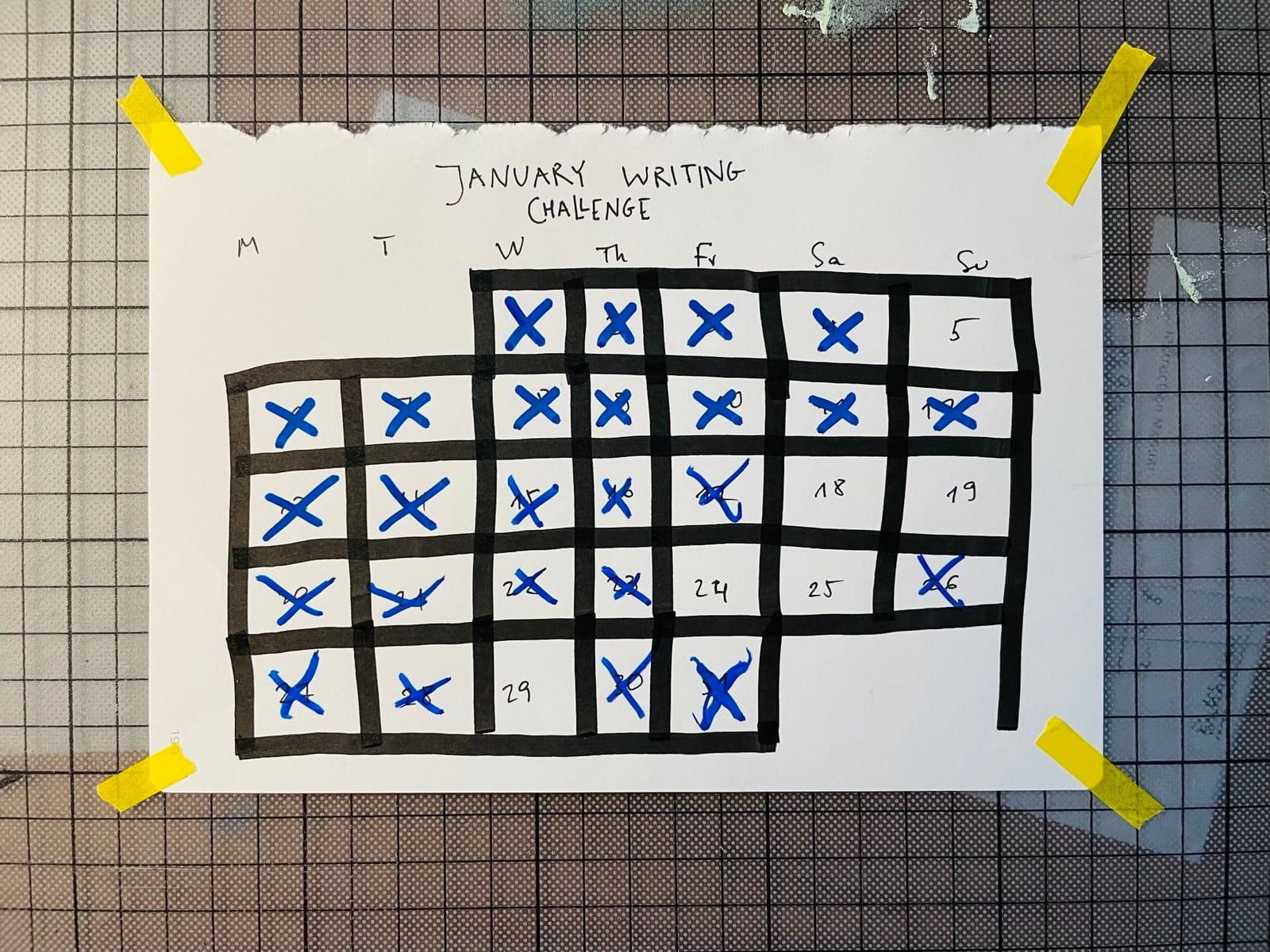I wrote everyday for a month, here's what happened

Every day in January, around 9 a.m., my friend H. sent me a text reminder that we had agreed to do a writing challenge. My goal was to read and edit the first draft of Project Wombat, a book about my experiences in the tech industry.
It wasn’t the first time I had committed to doing something daily for an extended period. In 2016, I posted photos of backyards on Instagram for a project called #366backyards. A few years later, I shared 30 notes before my 30th birthday. During the global pandemic, I also did something like 100 Days of Joy (anyone remembers that?). Needless to say, I knew the drill—the discipline a daily challenge requires.
I never start anything new on January 1st because it’s just a bad day to start anything. And yet, here I was, sitting on the sofa, editing the book. This challenge felt different because I wasn’t alone. Two other writers—hello, H. and S.!—were in the group chat, exchanging updates and impressions.
In case of a doubt, share it
As the first days flew by and the novelty wore off, the goal (Work on the book!) started to stifle my creativity rather than encourage it. After Extarary, I had wanted to keep sending out this newsletter, but with my energy split between work, appointments, book edits, and life, I felt like time was slipping away. It made me anxious and annoyed.
I asked my fellow writers for advice. Must I work on the book only, or can I write something else too? Their response was clear and full of encouragement:
Do whatever you want to do.
As in, the commitment is between me and... me.
As in, the point is to create a habit of writing.
As in, there’s no one right way to do it.
This might seem obvious to you, but yours truly has always had a tendency to be an all-or-nothing girlie with tunnel vision—one of those lingering relics of perfectionism that still hasn’t been fully erased from my system. Sharing my doubt helped me regain perspective, and over the course of the month, I switched between book edits and letters. Not only did this make the challenge more relaxed, but it also made it more joyful.
What does it mean to complete a challenge?
As you can see in the photo, I didn’t write every day. Life happened. I visited Warsaw, got sick, felt exhausted, and, more than anything, needed to rest. I could have forced myself to push through, to write no matter what. That’s how I used to operate—pretending to be a robot—because if I broke the streak, then all previous effort would feel wasted. I can’t even count the number of challenges I’ve abandoned because of this mindset. Again, all-or-nothing.
Thankfully, my fellow writers provided a reality check: It’s completely okay to take breaks. In fact, it’s better—to rest, to prevent burnout.
As you can see, I didn’t write every day. I missed six days—20% of the time. Can I still say I completed the challenge if I reached only 80% of my goal?
A few years ago, I would have said:
I failed terribly. Yet another sign that I lack discipline and can’t achieve anything.
Fuck me, I wouldn’t want to be her friend.
The truth is, if we look at it purely from the 20/80 perspective, I didn’t meet the goal of writing every day, and yet:
- I did finish editing the first draft of my book.
- I sent out 5 newsletters: More!, Celebrate Enough, Sanewashing, Libraries, AI and Warsaw, and The Unexpected Book Update.
- I didn't burn out and
- I am still writing.
Sounds successful enough to me.
The challenge of any challenge
It won’t come as a surprise that my past ideal of a disciplined person was disturbingly close to the stereotype of a ruthless Russian ballet teacher—pushing through with no mercy as the only acceptable way to succeed.
I hope you’re not like that. And yet, we’ve talked, and I know that perfectionism is not a foreign concept to you too. And perfectionism is a nightmare—a poison to both creativity and a fulfilled life.
We survived January. We deserted lists of New Year's resolutions. Now, I encourage you to take another look at them and try again.
If you have a dream project or a habit you’d like to build, start. Gently. You can take breaks. You can redefine the goal along the way. You can voice your doubts and ask for help.
We can do it together—without burning out.
Thank you for reading.
Wiktoria
PS. This week, in the music corner: Mahler's Second conducted by Leonard Bernstein. You might have heard about him from the movie Maestro but watching him at work is much better.
PS.2 The Only Girl in the Orchestra is a short documentary about Orin O'Brien, the first woman to play in the New York Philharmonic orchestra under Leonard Bernstein. I recommend!
